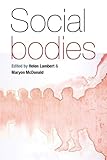Social Bodies / ed. by Helen Lambert, Maryon McDonald.
Material type: TextPublisher: New York ; Oxford : Berghahn Books, [2009]Copyright date: ©2009Description: 1 online resource (194 p.)Content type:
TextPublisher: New York ; Oxford : Berghahn Books, [2009]Copyright date: ©2009Description: 1 online resource (194 p.)Content type: - 9781845455538
- 9781845458973
- 306.4
- online - DeGruyter
| Item type | Current library | Call number | URL | Status | Notes | Barcode | |
|---|---|---|---|---|---|---|---|
 eBook
eBook
|
Biblioteca "Angelicum" Pont. Univ. S.Tommaso d'Aquino Nuvola online | online - DeGruyter (Browse shelf(Opens below)) | Online access | Not for loan (Accesso limitato) | Accesso per gli utenti autorizzati / Access for authorized users | (dgr)9781845458973 |
Frontmatter -- CONTENTS -- Introduction -- 1 Aged Bodies and Kinship Matters: The Ethical Field of Kidney Transplant -- 2 Anatomizing Conflict – Accommodating Human Remains -- 3 On the Treatment of Dead Enemies: Indigenous Human Remains in Britain in the Early Twenty-first Century -- 4 Towards a Critical Ötziography: Inventing Prehistoric Bodies -- 5 Bodies in Perspective: A Critique of the Embodiment Paradigm from the Point of View of Amazonian Ethnography -- 6 Using Bodies to Communicate -- Notes on Contributors -- Index
restricted access online access with authorization star
http://purl.org/coar/access_right/c_16ec
A proliferation of press headlines, social science texts and “ethical” concerns about the social implications of recent developments in human genetics and biomedicine have created a sense that, at least in European and American contexts, both the way we treat the human body and our attitudes towards it have changed. This volume asks what really happens to social relations in the face of new types of transaction – such as organ donation, forensic identification and other new medical and reproductive technologies - that involve the use of corporeal material. Drawing on comparative insights into how human biological material is treated, it aims to consider how far human bodies and their components are themselves inherently “social.” The case studies – ranging from animal-human transformations in Amazonia to forensic reconstruction in post-conflict Serbia and the treatment of Native American specimens in English museums – all underline that, without social relations, there are no bodies but only “human remains.” The volume gives us new and striking ethnographic insights into bodies as sociality, as well as a potentially powerful analytical reconsideration of notions of embodiment. It makes a novel contribution, too, to “science and society” debates.
Mode of access: Internet via World Wide Web.
In English.
Description based on online resource; title from PDF title page (publisher's Web site, viewed 25. Jun 2024)


